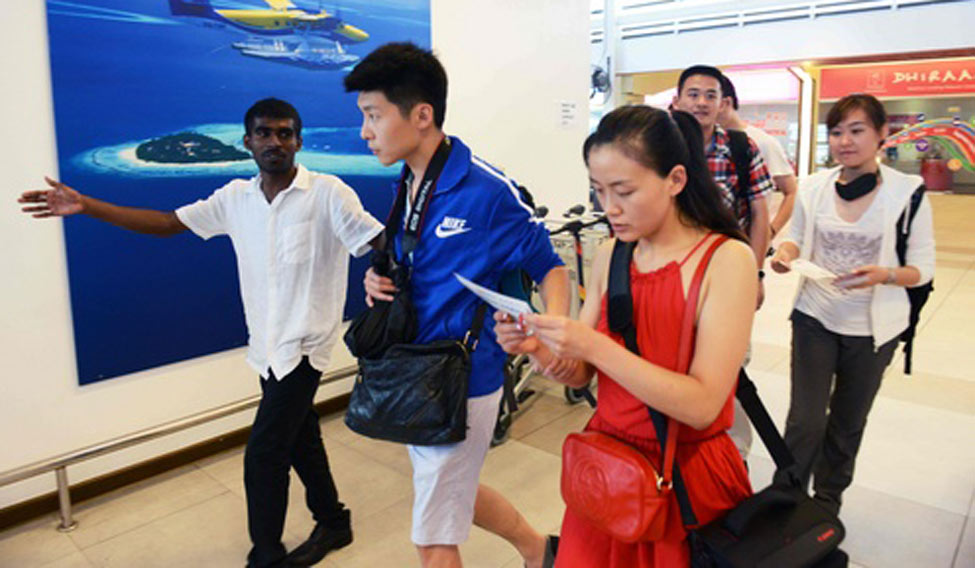The political crisis in the island nation of Maldives took another twist with President Abdulla Yameen ordering the arrest of Chief Justice Abdulla Saeed and another judge Ali Hameed of the Supreme Court to prevent the possibility of a move to impeach him.
The strong-arm tactics seemed to have yielded a favourable result as on Tuesday (February 6) the other three judges of the Supreme Court rescinded their earlier order of releasing nine opposition leaders, including former Mohamed Nasheed, who is currently in exile in Sri Lanka.
The state of emergency continues Maldives with Nasheed making a public plea to India through social media to intervene and save the nascent democratic movement in his small nation. India has expressed its concern and Delhi noted that it is “disturbed” by the sequence of events in Male and is monitoring the situation “carefully.”
Earlier, the US National Security Council had issued a statement saying, “America stands with the people of Maldives. The Maldivian government and military must respect the rule of law, freedom of expression, and democratic institutions. The world is watching.”
However, the geopolitical subtext apropos the Maldivian crisis has become more complex with Beijing throwing its weight behind the authoritarian actions of President Yameen. On February 6, the Chinese foreign office cautioned against any external intervention (clearly directed towards India and the US) and noted that in Beijing’s view, the Maldivian government and political parties “have the wisdom and capability to deal with the current situation on their own.”
Most observers aver that President Yameen has been emboldened to take the dictatorial stance, including ordering the arrest of his half-brother and former president Maumoon Abdul Gayoom, mainly because of the support that he has from China.
It may be recalled that over the past year, Maldives has moved closer to China under President Yameen with a number of mega-projects and unprecedented land ownership rights awarded to Beijing. Furthermore, a controversial free-trade agreement was signed by Maldives with China. Charges of financial impropriety have been leveled against the Yameen regime by the opposition—but to little avail. It is alleged that China’s deep pockets have subverted those aligned with the government.
The local Maldives police and the military are now the critical determinant whose loyalty in supporting the Yameen clamp-down will determine the tactical course of events over the next few days. The degree to which the local people in Male come out in support of the opposition parties and those committed to the rule of law (as represented by the arrested chief justice) will provide an indicator about the level of dissatisfaction—or lack thereof—with the Yameen regime.
The strategic tussle in relation to the Maldives is embedded in the geopolitical compulsions and priorities of the external powers represented by India, China and the USA. For India, the Maldives is a test-case about the credibility of Delhi’s politico-diplomatic influence in the face of a Chinese push into the Indian Ocean region.
As in case of other SAARC nations, Beijing has been successful in creating a vital pro-China faction among the local political parties and the business sector. Sri Lanka is case in point, where the Rajapakse government had entered into fiscally imprudent deals with China that have resulted in Colombo now having to enter into 99 year lease agreements of prize strategic real-estate.
Will Maldives, under President Yameen, follow the same path? The stakes for Beijing are high, for this maritime arc in the Indian-Ocean Rim (IOR) that links the islands with the Horn Of Africa and the Persian Gulf are vital nodes in the ambitious BRI (Belt and Road Initiative). Thus, the Chinese support to a regime in Male that is sympathetic and beholden to it is part of a familiar pattern in southern Asia.
For the USA, the Maldives may be a lower priority as compared to a North Korea or an Afghanistan but the strategic salience of the IOR is abiding. The US military investment in Diego Garcia will now have to contend with a growing Chinese presence in the Maldives and Djibouti that has the potential to roil the famed turquoise waters abutting the popular tourist acclaimed islands.
Delhi will indeed have to monitor all these developments very carefully.





